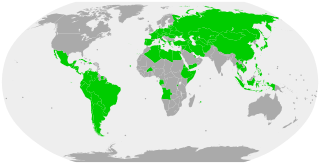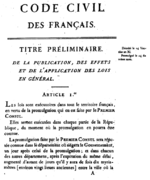
In law, common law is the body of law created by judges and similar quasi-judicial tribunals by virtue of being stated in written opinions.

Comparative law is the study of differences and similarities between the law of different countries. More specifically, it involves the study of the different legal "systems" in existence in the world, including the common law, the civil law, socialist law, Canon law, Jewish Law, Islamic law, Hindu law, and Chinese law. It includes the description and analysis of foreign legal systems, even where no explicit comparison is undertaken. The importance of comparative law has increased enormously in the present age of internationalism, economic globalization, and democratization.

Roman law is the legal system of ancient Rome, including the legal developments spanning over a thousand years of jurisprudence, from the Twelve Tables, to the Corpus Juris Civilis ordered by Eastern Roman emperor Justinian I. Roman law forms the basic framework for civil law, the most widely used legal system today, and the terms are sometimes used synonymously. The historical importance of Roman law is reflected by the continued use of Latin legal terminology in many legal systems influenced by it, including common law.

The Napoleonic Code, officially the Civil Code of the French, is the French civil code established during the French Consulate period in 1804 and still in force in France, although heavily and frequently amended since its inception.

A civil code is a codification of private law relating to property, family, and obligations.

Legal history or the history of law is the study of how law has evolved and why it has changed. Legal history is closely connected to the development of civilisations and operates in the wider context of social history. Certain jurists and historians of legal process have seen legal history as the recording of the evolution of laws and the technical explanation of how these laws have evolved with the view of better understanding the origins of various legal concepts; some consider legal history a branch of intellectual history. Twentieth-century historians viewed legal history in a more contextualised manner – more in line with the thinking of social historians. They have looked at legal institutions as complex systems of rules, players and symbols and have seen these elements interact with society to change, adapt, resist or promote certain aspects of civil society. Such legal historians have tended to analyse case histories from the parameters of social-science inquiry, using statistical methods, analysing class distinctions among litigants, petitioners and other players in various legal processes. By analyzing case outcomes, transaction costs, and numbers of settled cases, they have begun an analysis of legal institutions, practices, procedures and briefs that gives a more complex picture of law and society than the study of jurisprudence, case law and civil codes can achieve.

Law and economics, or economic analysis of law, is the application of microeconomic theory to the analysis of law. The field emerged in the United States during the early 1960s, primarily from the work of scholars from the Chicago school of economics such as Aaron Director, George Stigler, and Ronald Coase. The field uses economics concepts to explain the effects of laws, to assess which legal rules are economically efficient, and to predict which legal rules will be promulgated. There are two major branches of law and economics; one based on the application of the methods and theories of neoclassical economics to the positive and normative analysis of the law, and a second branch which focuses on an institutional analysis of law and legal institutions, with a broader focus on economic, political, and social outcomes, and overlapping with analyses of the institutions of politics and governance.
A criminal code is a document that compiles all, or a significant amount of, a particular jurisdiction's criminal law. Typically a criminal code will contain offences that are recognised in the jurisdiction, penalties that might be imposed for these offences, and some general provisions.
The Bürgerliches Gesetzbuch, abbreviated BGB, is the civil code of Germany, codifying most generally-applicably private law. In development since 1881, it became effective on 1 January 1900, and was considered a massive and groundbreaking project.

The special territories of members of the European Economic Area (EEA) are the 32 special territories of EU member states and EFTA member states which, for historical, geographical, or political reasons, enjoy special status within or outside the European Union and the European Free Trade Association.
Europe, the westernmost portion of Eurasia, is often divided into regions and subregions based on geographical, cultural or historical factors. Since there is no universal agreement on Europe's regional composition, the placement of individual countries may vary based on criteria being used. For instance, the Balkans is a distinct geographical region within Europe, but individual countries may alternatively be grouped into South-eastern Europe or Southern Europe.

Civil law is a legal system originating in Italy and France and has been adopted in large parts of the world. The civil law system is intellectualized within the framework of Roman law and French civil law, and with core principles codified into a referable system, which serves as the primary source of law. The civil law system is often contrasted with the common law system, which originated in medieval England. Whereas the civil law takes the form of legal codes, the common law comes from uncodified case law that arises as a result of judicial decisions, recognising prior court decisions as legally binding precedent.
The legal origins theory claims that the two main legal traditions or origins, civil law and common law, crucially shape lawmaking and dispute adjudication and have not been reformed after the initial exogenous transplantation by Europeans. Therefore, they affect economic outcomes to date. According to the evidence reported by the initial proponents of such a theory, countries that received civil law would display today less secure investor rights, stricter regulation, and more inefficient governments and courts than those that inherited common law. These differences would reflect both a stronger historical emphasis of common law on private ordering and the higher adaptability of judge-made law.

A code of law, also called a law code or legal code, is a systematic collection of statutes. It is a type of legislation that purports to exhaustively cover a complete system of laws or a particular area of law as it existed at the time the code was enacted, by a process of codification. Though the process and motivations for codification are similar in different common law and civil law systems, their usage is different.
Laesio enormis is a legal doctrine that gives a contracting party the ability to rescind an agreement if the price of exchange is less than a certain proportion of its actual value. The principle was developed as a way to ensure that people received a just price in exchange, and in opposition to the Imperial Roman view, found in the Corpus Juris Civilis, that the parties to an exchange were entitled to try to outwit one another.
Lithuanian law is a part of the legal system of Lithuania. It belongs to the civil law legal system, as opposed to the common law legal system. The legal system of Lithuania is based on epitomes of the French and German systems. The Lithuanian legal system is grounded on the principles laid out in the Constitution of the Republic of Lithuania and safeguarded by the Constitutional Court of the Republic of Lithuania.
The Burgerlijk Wetboek is the Civil Code of the Netherlands. Early versions were largely based on the Napoleonic Code. The Dutch Civil Code was substantively reformed in 1992. The Code deals with the rights of natural persons, legal persons, patrimony and succession. It also sets out the law of property, obligations and contracts, and conflict of laws. Proposed amendments will add a Book on intellectual property.

The law of Sweden is a civil law system, whose essence is manifested in its dependence on statutory law. Sweden's civil law tradition, as in the rest of Europe, is founded upon Roman law as codified in the Corpus Juris Civilis, but as developed within German law, rather than upon the Napoleonic Code. But, over time Sweden along with the other Scandinavian countries have deviated significantly from their classical Roman and German models. Instead, the Scandinavian countries together with Finland, the Faroe Islands, Greenland, Åland (self-governing) and Iceland may be said to have a special "Nordic" version of jurisprudence that is neither a truly civil law system nor a part of the British-derived common law legal system.

The International Roman Law Moot Court (IRLMC) is an international European annual moot court competition in Roman law.









